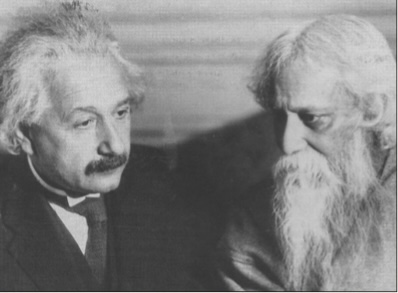On July 14, 1930, Albert Einstein hosted the Indian poet-philosopher, Rabindranath Tagore at his home in Kaput, Germany. They had what has been called “one of the most stimulating, intellectually riveting conversations in history.” Tagore documented this and other dialogs with Einstein in his book The Religion of Man, an edited compilation of his lectures at Oxford University in 1930. This conversation, excepted below, has gone viral on the Internet, touching countless thinkers across the globe.
Einstein: Do you believe in the Divine as isolated from the world?
Tagore: Not isolated. The infinite personality of Man comprehends the Universe. There cannot be anything that cannot be subsumed by the human personality, and this proves that the Truth of the Universe is human Truth. Matter is composed of protons and electrons, with gaps between them; but matter may seem to be solid. Similarly, humanity is composed of individuals, yet they have their interconnection of human relationship. The entire universe is linked up with us in a similar manner. It is a human universe.
Einstein: There are two different conceptions about the nature of the universe: (1) The world as a unity dependent on humanity. (2) The world as a reality independent of the human factor.
Tagore: When our universe is in harmony with Man, the eternal, we know it as Truth, we feel it as beauty.
Einstein: This is the purely human conception of the universe.
Tagore: There can be no other conception. This world is a human world; the scientific view of it is also that of the scientific man. There is some standard of reason and enjoyment which gives it Truth, the standard of the Eternal Man whose experiences are through our experiences.
Einstein: This is a realization of the human entity.
Tagore: Yes, one eternal entity. We have to realize it through our emotions and activities. We realize the Supreme Man who has no individual limitations through our limitations. Science is concerned with that which is not confined to individuals; it is the impersonal human world of Truths. Religion realizes these Truths and links them up with our deeper needs; our individual consciousness of Truth gains universal significance. Religion applies values to Truth, and we know this Truth as good through our own harmony with it.
Einstein: I cannot prove scientifically that Truth must be conceived as valid independent of humanity; but I believe it firmly. I believe that the Pythagorean theorem in geometry states something that is approximately true, independent of the existence of man. Anyway, if there is a reality independent of man, there is also a Truth relative to this reality. The negation of the first negates the latter.
Tagore: Truth, which is one with the Universal Being, must essentially be human. Otherwise whatever we individuals realize as true can never be called truth–at least the Truth which is described as scientific and which only can be reached through the process of logic, in other words, by an organ of thoughts which is human. According to Indian philosophy, there is Brahman, the absolute Truth, which cannot be conceived by the isolation of the individual mind or described by words, but can only be realized by completely merging the individual in its infinity. But such a Truth cannot belong to science. The nature of Truth which we are discussing is an appearance. What appears to be true to the human mind and therefore is human may be called maya or illusion.
Einstein: Even in our everyday life we feel compelled to ascribe a reality independent of man to the objects we use. We do this to connect the experiences of our senses in a reasonable way. For instance, if nobody is in this house, yet that table remains where it is.
Tagore: Yes, it remains outside the individual mind, but not the universal mind. The table which I perceive is perceptible by the same kind of consciousness which I possess.
Einstein: If nobody would be in the house the table would exist all the same; but this is already illegitimate from your point of view, because we cannot explain what it means that the table is there, independently of us. Our natural view of the existence of truth apart from humanity cannot be explained or proved, but it is a belief which nobody can lack, not even primitive beings. We attribute to Truth a super-human objectivity; it is indispensable for us, this reality which is independent of our existence, our experience and our mind, though we cannot say what it means.
Tagore: Science proves that the table’s solidity is an appearance. That which the human mind perceives as a table would not exist if that mind were naught. The ultimate physical reality is nothing but a multitude of separate revolving centres of electric force.
In the apprehension of Truth there is an eternal conflict between the universal human mind and the same mind confined in the individual. The perpetual process of reconciliation is being carried on in our science, philosophy, in our ethics.
In any case, if there be any Truth absolutely unrelated to humanity then for us it is absolutely non-existing. For the moth which eats paper, literature is absolutely non-existent, yet for Man’s mind literature has a greater value of Truth than the paper itself. In a similar manner if there be some Truth which has no sensuous or rational relation to the human mind, it will ever remain as nothing so long as we remain human beings.
Einstein: Then I am more religious than you are!
Tagore: My religion is in the reconciliation of the Super-personal Man, the universal human spirit, in my own individual being.
